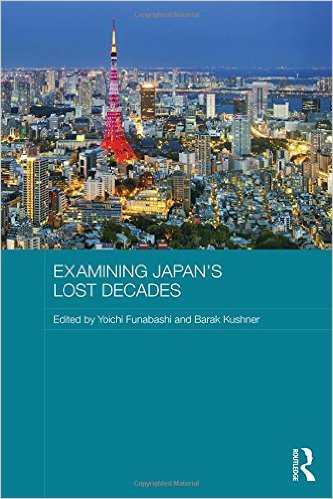
Toward Japan’s rebuilding, it is imperative that we undertake a critical review of the country’s so-called “Lost Decade(s).” What specifically did Japan lose? How and why did Japan’s policies fail? What was the alternative? In light of the further economic and political meltdowns likely to cloud Japan’s prospects in the coming years, such questions must be addressed head-on.
Getting to the bottom of these questions goes beyond national concerns; it goes beyond rebuilding Japan. Given Japan’s key role in the regional order, Japan’s precipitous decline would gravely destabilize the Asia-Pacific and, more broadly, the world. It is crucial to shed light on this linkage.
In this sense, we reviewed past few decades from an international perspective rather than from a myopically Japan-centric one. The research took the format of a case study in 15 discourses. International research team collected the oral history, which the section authors then harness to compose the report. The team consists of both Japanese and international authors and researchers.
The Report
Why has Japan still not been able to recover after the collapse of the bubble economy? This is the key puzzle that this project seeks to answer. A team of leading Japanese and international experts were assembled to examine Japan’s “Lost Decades” from multiple perspectives, such as: Japan’s public finance, international relations, demographics, labor structure, women’s life patterns, intergenerational fairness, business and technological innovation, etc.
Japan’s experience has global relevance and there are lessons to be learned from Japan’s “lost 20 years.” Developed countries across the world are facing the same economic and social challenges that have plagued Japan. Accordingly, Japan can serve as a model for future policy initiatives that will contribute to providing solutions to shared global challenges in the 21st century.
Routledge Contemporary Japan Series
“Examining Japan’s Lost Decades”
Edited by Yoichi Funabashi, Chairman, RJIF and Barak Kushner, University of Cambridge, Reader, the Faculty of Asian and Middle Eastern Studies
Publisher: Routledge Contemporary Japan Series
First Published: April 20, 2015
ISBN-13: 978-1138885752
1. Japan’s Demographic Collapse and Vanishing Provinces
2. Monetary and Fiscal Policies (Japan’s fiscal policy failure)
3. The Two “Lost Decades” and Macroeconomics: Changing Economic Policies)
4. The Curse of “Japan, Inc.” and Japan’s Microeconomic Competitiveness
5. Making Sense of the Lost Decades: Workplaces and Schools, Men and Women, Young and Old, Rich and Poor
6. The Two Lost Decades in Education: The Failure of Reform
7. The Fukushima Nuclear Accident: Lost Opportunities and the “Safety Myth”
8. The Last Two Decades in Japanese Politics: Lost Opportunities and Undesirable Outcomes
II. THE GLOBAL SPHERE: DIPLOMACY AND NATIONAL SECURITY POLICY
9. The Gulf War and Japan’s National Security Identity
10. Foreign Economic Policy Strategies and Economic Performance
11. Japan’s Asia / Asia-Pacific Policy in Flux
12. Okinawa Bases and the U.S. – Japan Alliance
13. Japanese Historical Memory
14. Japan’s Failed Bid for a Permanent Seat on the UN Security Council
15. The Stakeholder State: Ideology and Values in Japan’s Search for a Post-Cold War Global Role
The International Conference
The International Conference for the Lost Decades project was carried out May 10th – 12th.
The aim of the international conference is for the author and researchers to gather in Tokyo and hold discussions on the contents and linkage of each chapter besides the conceptual question of “what is the lost decades?”. Since the project was launched in January, the Japanese authors and researchers had held meetings on a regular basis and contact with the authors overseas were carried out through teleconference but this is an important milestone in the process of the project and to deepen the understanding between each theme and chapter to push forward on the research. The authors and researchers came to a conclusion on the image of the final output of the project in order to carry out actual interviews and surveys.
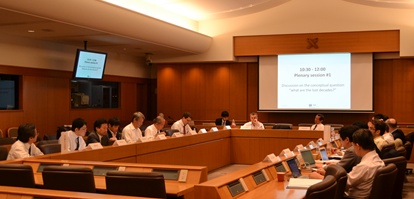
Day1: Plenary session
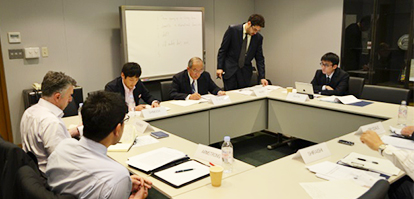
Day 1:Break-out session
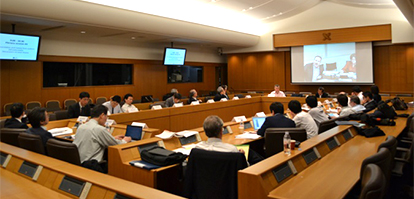
Day 2:Plenary session (Videoconference from Washington)
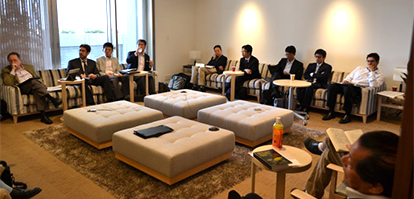
Day3: Plenary session
Author

Atsushi SEIKE
President, Keio University
He received BA in Economics and his MA and Ph.D. in Business and Commerce from Keio in 1978, 1980, 1993 respectively. He became Professor in Keio’s faculty of Business and Commerce in 1992, serving as Dean from 2007-2009. He is a specialist in labor economics, authoring many books on this topic in Japanese including Towards an Age-free Society, and has received a number of academic prizes including Commendation of Excellent labor Related Publication 17th Prize, Japan Institute of Labor and the Yomiuri Shinbun-sya, 1994. He is currently a member of Labor Policy Council, Chairman of the Policy Studies Group for the Aged Society.

Adam S. POSEN
President, the Peterson Institute for International Economics (PIIE)
Member of the Monetary Policy Committee of the Bank of England, 2009-2012. Member of the Panel of Economic Advisers to the US Congressional Budget Office, 2007-present. His research and policy expertise focuses on macroeconomic policy, European and Japanese political economy, central banking issues, and the resolution of financial crises.

Kenneth N. KUTTNER
Professor, Economics at Williams College
His research has addressed such issues as the roles of monetary aggregates and interest rates in monetary policy, inflation targeting, methods for
estimating potential output, the Japanese economy, and financial markets’ reaction to
shifts in Federal Reserve policy.

Keiichiro KOBAYASHI
Professor, Faculty of Economics, Keio University
Research Director of Canon Institute for Global Studies
He Joined the MITI in 1991 and was Fellow at RIETI from 2001. Extensive experience in macroeconomics research in areas such as endogenous growth theory, business cycles theory, financial crisis, and bad debt problem.

Kazuhiko TOYAMA
CEO and Representative Director of Industrial Growth Platform, Inc., (IGPI)
With a background in business and a reputation as an innovator, he founded IGPI in 2007 and has seen the company thrive by providing management support services to struggling companies and offering strategies for long-term, sustainable business operations. A member of Japan’s Council on Economic Fiscal Policy, and the Council for Science and Technology’s Basic Plan Special Committee.

Andrew GORDON
Lee and Juliet Folger Fund Professor of History , Harvard University
He served as Director of the Edwin O. Reischauer Institute of Japanese Studies from 1998-2004 and 2011-2012. He teaches courses on modern Japanese history with a primary research interest in labor, class and the social and political history of modern Japan. He is currently working with colleagues in Japan and the United States to create a digital archive of Japan’s March 2011 disasters.

Satoshi MACHIDORI
Professor, Graduate School of Law and School of Public Policy, Kyoto University
His expertise is in comparative politics. Major research themes are: Processes and structures of policy making in the legislatures; Inter-branch relationship in democratic polity.

Koichi KITAZAWA
President, Tokyo City University
Former president of Japan Science and Technology Agency
Chairman of the Independent Investigation Commission on Nuclear Accident of Tokyo Electric Daiichi Nuclear Power Station founded by Japan Rebuild Initiative Foundation.

Takehiko KARIYA
Professor, Sociology of Japanese Society and Faculty Fellow, University of Oxford
He obtained his PhD in sociology at Northwestern University. He came to Oxford in 2008 from the Graduate School of Education at the University of Tokyo, where he had been a professor of sociology of education until 2009. His main areas of research are in sociology of education, social stratification, school-to-work transition, educational and social policies, and social changes in postwar Japan.

Michael J. GREEN
Senior Vice President for Asia / Japan Chair, Center for Strategic & International Studies (CSIS)
Associate professor, Edmund A. Walsh School of Foreign Service
His current research and writing is focused on Asian regional architecture, Japanese politics, U.S. foreign policy history, the Korean peninsula, Tibet, Burma, and U.S.-India relations.

Kazuhiko TOGO
Professor, Kyoto Sangyo University
Director of Institute for World Affairs
Former Ambassador of Japan to the Netherlands. Major expertise in the Ministry of Foreign Affairs was Russia. After retirement in 2002, taught at many universities including Leiden, Princeton, and Seoul National. His recent publication covers Japanese foreign policy, territorial issues, historical memory issues, and Japan’s lost national objectives.

Peter DRYSDALE
Emeritus Professor of Economics
the Head of the East Asian Bureau of Economic Research and East Asia Forum, the Crawford School of Public Policy , the Australian National University
He is widely recognized as the leading intellectual architect of APEC. He is recipient of the Asia Pacific Prize, the Weary Dunlop Award, the Japanese Order of the Rising Sun with Gold Rays and Neck Ribbon, the Australian Centenary Medal and he is a member of the Order of Australia.

Shiro ARMSTRONG
Research Fellow, the Crawford School of Public Policy, the Australian National University
He is also Editor of the East Asia Forum. Expertise in international economics and Asian economic integration.

Sheila A. SMITH
Senior Fellow for Japan Studies, the Council on Foreign Relations (CFR)
Expertise in Japanese domestic politics and foreign policy; Northeast Asia regional security; and international relations of the Asia Pacific.

Takashi SHIRAISHI
President, National Graduate Institute for Policy Studies (GRIPS)
President, JETRO Institute of Developing Economies
He has taught at the University of Tokyo, Cornell University, Kyoto University, and GRIPS in Tokyo. He served as Standing Executive Member, Council for Science and Technology Policy (CSTP), Cabinet Office.

Nobumasa AKIYAMA
Professor, Graduate School of Law, School of International and Public Policy, Hitotsubashi University
His research field is international politics, international security.

G. John IKENBERRY
Albert G. Milbank Professor of Politics and International Affairs, Department of Politics and the Woodrow Wilson School of Public and International Affairs, Princeton University
Also, Co-Director of Princeton’s Center for International Security Studies, and a Global Eminence Scholar at Kyung Hee University in Seoul, Korea. In 2013-2014, he is the 72nd Eastman Visiting Professor at Balliol College, Oxford.
Researcher

Researcher, JETRO Institute of Developing Economies
Law and Institution Studies Group, Inter-disciplinary Studies Center. His research field is Indonesia and Thai politics, Urban Politics in Southeast Asia, Overseas Chinese in Southeast Asia. He earned his Ph.D. in Area Studies from Kyoto University in 2006.

Doctoral student, the Department of Law, Keio University
He received his undergraduate training at Georgetown University (one-year exchange program, Heiwa Nakajima Foundation scholar) and International Christian University (Chris-Wada scholar). He subsequently received his M.A. in political science (international relations) from Columbia University (Japanese government fellowship scholar). He was a recipient of the security studies fellowship from the Research Institute for Peace and Security (2010-2012). He was involved in drafting the report by the Independent Investigation Commission on the Fukushima Daiichi Nuclear Accident. He is currently a non-resident SPF fellow at Pacific Forum CSIS and a Research Assistant at Keio University, Center of Governance for Civil Society.

Professor, Institute of Economic Research, Hitotsubashi University
He also teaches finance and macroeconomics in the Department of Economics and at Hitotsubashi’s Graduate School of International Corporate Strategy. He held the position of Principal Economist at the Institute of Policy Research, Ministry of Finance, Japan from April 2009 to March 2011. He earned his Ph.D. in economics from Harvard University in 1997.

Former Professor, Faculty of Social Work, Japan College of Social Work
He obtained his Bachelor’s Degree of Laws at the University of Tokyo. His research field is Social security policy.

Associate Professor, Faculty of Law, Waseda University
Specializes in modern Japanese history, especially regional history and historical remembrance of the Showa era.

MBA student at Judge Business School, the University of Cambridge
Prior to the MBA course, he worked as a management consultant at Industrial Growth Platform, Inc. (IGPI) and McKinsey & Company. His clients included a few government agencies and various middle to large enterprises in electric utility, telecommunications, manufacturing, healthcare, and high-tech industries. He obtained his Bachelor’s Degree of Laws (Department III: Political Science) at the University of Tokyo.

Associate Professor, Graduate School of System, Design and Management, Keio University
Research interest: comparative institutional study of party organizations, decentralization, local politics, and institutional reform.
Former correspondent for the Financial Times of London (2000-2003); PhD, Faculty of Asian and Middle Eastern Studies, Cambridge UK (2009); Guest researcher at Osaka City University (2010). Swedish citizen.

Ph.D candidate, Department of Nuclear Engineering and Management School of Engineering, the University of Tokyo
His areas of interest are nuclear policy, nuclear non-proliferation and nuclear security. He has experiences in nuclear policy research at International Atomic Energy Agency, Japan Atomic Energy Agency and Ministry of Foreign Affairs of Japan. He was a member of the working group of Independent Investigation Commission on the Fukushima Daiichi Nuclear Accident.

Part-time Lecturer, the School of Law, Meiji University
His specialty is Japanese political history research after the World War II. In particular, it is research of the prime minister system and bureaucracy.
There is “The origin of the political system of post war Japan : Shigeru Yoshida’s prime minister-led initiative” (Fujiwara Shoten, 2008) as a work.

Manager, Industrial Growth Platform, Inc. (IGPI)
He is a management consulting, turnaround and investment firm. Jan’s business experience includes engagements with various companies in high-tech, online media, healthcare, heavy machinery manufacturing and automotive sector. Prior to joining IGPI, Jan was an investment banker with Citigroup covering technology companies in Japan and project manager for new vehicle development at Toyota Motor Corporation’s global headquarters. Jan earned his MBA from the Wharton School and MA from Joseph H. Lauder Institute of the University of Pennsylvania. He also has a dual master degree in History and Japanese Studies from Palacky University. Czech citizen.
Advisor

Senior Global Correspondent, the Asahi Shimbun
He covers economics and business with a particular focus on the economic security and global issues. He organized the major annual energy-climate conference in Japan, The Asahi Environmental Forum for three years after reporting the critical years in Washington DC as a chief US economic correspondent between 1999-1996. Prior to that, he directed reporting as a news desk editor and the section head of the Japanese business sector news gathering in Tokyo. Nishizaki was the first bureau chief in the Silicon Valley, US, after actively having reported the US finance and business as a New York bureau correspondent since 1998. Before then, he covered the Japanese Ministries of Finance, Trade and Industry and Foreign Affairs while also reporting widely the electronics and machinery, infrastructure and service industries in Japan.
Editor / Project office

Barak D. KUSHNER
Senior University Lecturer, the Faculty of Asian & Middle Eastern Studies (formerly the Faculty of Oriental Studies), the University of Cambridge
He has a PhD in History from Princeton University. He was recently awarded a 2012 British Academy Mid-Career Fellowship which he will use to complete his book on Japanese War Crimes Trials in China. In the summer of 2008 he was a visiting scholar at Nanjing University (China) and during 2009 he was a visiting scholar at Waseda University (Japan). He was a 2008 Abe Fellow and conducted research concerning “Cold War Propaganda in East Asia and Historical Memory.”

Yoichi FUNABASHI
Chairman, Rebuild Japan Initiative Foundation
Former Editor-in-Chief and Columnist for the Asahi Shimbun
He is a contributing editor of Foreign Policy (Washington, DC). In 1985 he received the Vaughn-Ueda Prize for his reporting on international affairs. He won the Japan Press Award, known as Japan’s “Pulitzer Prize”, in 1994 for his columns on foreign policy, and his articles in Foreign Affairs and Foreign Policy won the Ishibashi Tanzan Prize in 1992.
He is the author of several prizewinning books; Alliance Adrift (Council on Foreign Relations Press, 1998, winner of the Shincho Arts and Sciences Award); Asia-Pacific Fusion: Japan’s Role in APEC (Institute for International Economics, 1995, winner of the Mainichi Shimbun Asia Pacific Grand Prix Award) and others.

Kay KITAZAWA
Fellow, Rebuild Japan Initiative Foundation

Assistant, Rebuild Japan Initiative Foundation
 APIニュースレター 登録
APIニュースレター 登録